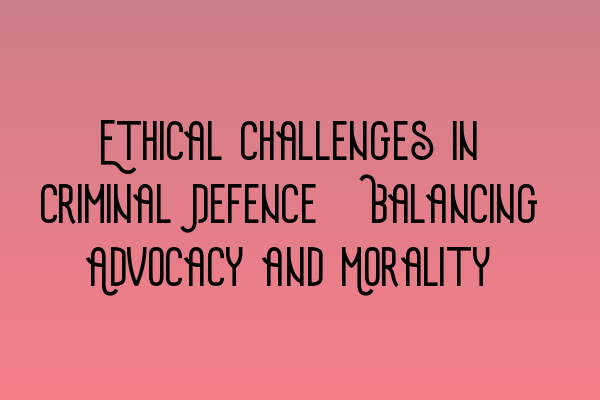Ethical Challenges in Criminal Defence: Balancing Advocacy and Morality
Criminal defence lawyers have a difficult task of advocating for their clients while also upholding ethical standards and moral principles. They are tasked with examining the evidence against their clients, questioning witnesses, and presenting arguments in court to ensure a fair trial. However, this advocacy can sometimes clash with personal morals and ethical considerations.
Understanding the Role of a Criminal Defence Lawyer
Before delving into the ethical challenges, it is important to understand the role of a criminal defence lawyer. These legal professionals are dedicated to representing individuals accused of committing criminal offenses. Their main goal is to ensure that their clients receive a fair trial and are given the opportunity to present their case and defend themselves against the charges.
In doing so, criminal defence lawyers are expected to be zealous advocates, fighting for their clients’ best interests and using all legal means available to secure a favorable outcome. They must diligently investigate the case, challenge the evidence presented by the prosecution, and provide a strong defense.
The Ethical Dilemma
Despite the importance of advocacy, criminal defence lawyers often encounter ethical dilemmas in their line of work. One such challenge is the conflict between their professional duty to provide effective representation and the moral considerations that may arise during the course of a case.
For instance, a lawyer may believe that their client is guilty of a crime but still has the responsibility to defend them to the best of their abilities. This moral dilemma raises questions about the lawyer’s role as a guardian of justice. How can they advocate for someone they believe is guilty without compromising their own integrity?
Another ethical challenge stems from the obligation to uphold confidentiality. Criminal defence lawyers are bound by strict rules of confidentiality, which means they cannot disclose any information shared by their clients unless permitted by law. This duty of confidentiality can become challenging when clients admit to illegal activities or provide information that may jeopardize the safety of others.
Striking the Balance
Striking a balance between advocacy and morality is not an easy task, but there are certain strategies that criminal defence lawyers can employ to navigate these ethical challenges.
Firstly, maintaining clear boundaries and keeping personal beliefs separate from professional obligations can help lawyers ensure that they fulfill their duty to advocate for their clients effectively. Objectivity and professionalism are vital in this field.
Furthermore, seeking guidance from professional organizations and ethics committees can provide lawyers with insights into ethical dilemmas and ways to handle them. Continuous professional development and staying updated with the latest legal and ethical developments are crucial for effectively managing these challenges.
Conclusion
Ethical challenges in criminal defence require lawyers to navigate a complex terrain where advocacy and morality often collide. Upholding professional duties while also maintaining personal morals is no easy task. However, by employing strategies such as maintaining clear boundaries and seeking guidance, lawyers can strive to strike a balance and ensure they provide effective representation while upholding ethical standards.
If you are interested in learning more about the SQE examinations and preparation, we recommend checking out our related articles:
SQE 1 Practice Exam Questions,
SQE 1 Practice Mocks FLK1 FLK2,
SQE 2 Preparation Courses,
SQE 1 Preparation Courses, and
SRA SQE Exam Dates.
